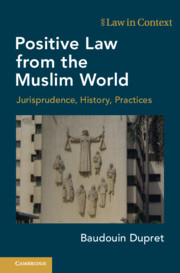4 results
Conclusion: A Praxeological Approach to Positive Law
-
- Book:
- Positive Law from the Muslim World
- Published online:
- 16 June 2021
- Print publication:
- 24 June 2021, pp 253-262
-
- Chapter
- Export citation
7 - General and Particular: The Legal Rule and an Islamic Swimsuit in a Secular Context
- from Part III - Legal Praxeologies
-
- Book:
- Positive Law from the Muslim World
- Published online:
- 16 June 2021
- Print publication:
- 24 June 2021, pp 177-193
-
- Chapter
- Export citation
9 - Playing by the Rules: The Search for Legal Grounds in Homosexuality Cases – Indonesia, Lebanon, Egypt, and Senegal
- from Part III - Legal Praxeologies
-
- Book:
- Positive Law from the Muslim World
- Published online:
- 16 June 2021
- Print publication:
- 24 June 2021, pp 219-252
-
- Chapter
- Export citation

Positive Law from the Muslim World
- Jurisprudence, History, Practices
-
- Published online:
- 16 June 2021
- Print publication:
- 24 June 2021

